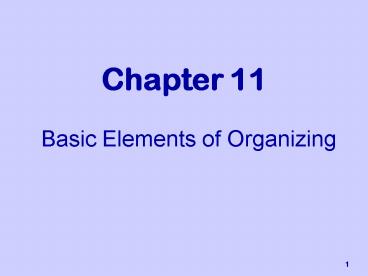Basic Elements of Organizing PowerPoint PPT Presentation
1 / 10
Title: Basic Elements of Organizing
1
Chapter 11
- Basic Elements of Organizing
2
Key Concepts in Organizing
- Organizing
- Deciding how to best group organizational
activities and resources - Organization Structure
- Set of building blocks that can be used to
configure an organization - Job Specialization
- Degree to which the overall task of the
organization is broken down into smaller
components
3
Alternatives to Job Specialization
- Job Rotation
- Job Enlargement
- Job Enrichment
- Job Characteristics Approach
- Work Teams
4
Chain of Command
- Chain of Command
- A clear and distinct line of authority among the
positions in an organization. - Unity of Command
- Each person within an organization must have a
clear reporting relationship to one and only one
boss. - Scalar Principle
- A clear and unbroken line of authority must
extend from the bottom to the top of the
organization.
5
Span of ManagementTall versus Flat
- Tall Organizations
- More expensive
- Communication can be difficult because of the
number of channels through which it must pass
- Flat Organizations
- Lead to higher levels of employee morale and
productivity - More administrative responsibility for managers
6
Parts of the Delegation Process
- Assigning responsibility
- Granting authority
- Creating accountability
7
DelegationProblems in the Delegation Process
- Superior
- Reluctance to delegate
- Disorganization
- Concern that success of subordinate will threaten
superiors advancement - Lack of trust
- Subordinate
- Reluctance to accept delegation
- No rewards for the acceptance of delegated tasks
- Risk avoidance
8
Centralization vs. Decentralization
- Factors Determining Level of Centralization
- External Environment
- Organizational History
- Nature of Decisions
- Expertise of Lower Level Managers
9
Three Major Forms of Interdependence
- Pooled Interdependence
- When units operate with little interaction their
output is simply pooled at the organizational
level. - Sequential Interdependence
- When the output of a unit then becomes input for
another unit. - Reciprocal Interdependence
- When activities flow both ways.
10
Differentiating Between Positions
- Line Positions
- Positions in the direct chain of command that are
responsible for the achievement of an
organizations goals - Staff Positions
- Intended to provide expertise, advice, and
support to line positions - Administrative Intensity
- The degree to which managerial positions are
concentrated in staff positions.

